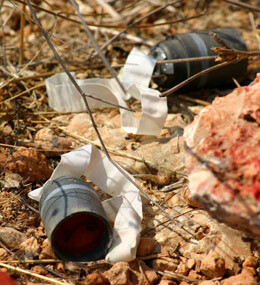United Nations News Service 30 August 2006

Israeli cluster bombs, like these ones lying outside Nabatiyeh on 18 August 2006, continue to kill civilians. (Hugh Macleod/IRIN)
Under-Secretary-General for Humanitarian Affairs Jan Egeland also said that around a quarter of a million Lebanese returnees who fled their homes during the month of fighting were unable to return because of the devastation or for fear of injury caused by these and other unexploded ordnance.
“What’s shocking and I would say to me, completely immoral, is that 90 per cent of the cluster bomb strikes occurred in the last 72 hours of the conflict when we knew there would be a resolution, when we really knew there would be an end of this,” he told reporters in New York.
“Cluster bombs … have affected large areas, lots of homes, lots of farmland, lots of commercial businesses and shops and they will be with us for many, many months, possibly for years. Everyday people are maimed, wounded and are killed by these ordnance, it shouldn’t have happened.”
UN teams have been helping remove these bomblets and other unexploded ordnance since the cessation of hostilities between Israel and Hizbollah came into effect on August 14, and Mr. Egeland said nearly 85 per cent of bombed areas in southern Lebanon had now been assessed to reveal “shocking new information.”
“They identified 359 separate cluster bombed strike locations that are contaminated with as many as 100,000 unexploded bomblets … The people returning home however are facing massive problems, 250,000 of them in our view are not able to move into their homes at all because they are destroyed or because of unexploded ordnance.”
In addition to the unexploded cluster bomblets, Mr. Egeland said there was also around 20,000 pieces of other unexploded ordnance, including mines, although the bomblets were the main threat to the Lebanese returnees because they have been scattered over such a large area.
Turning to other humanitarian assistance for Lebanon, Mr. Egeland said the UN and all international organizations would fully support the Government as it moves toward the new stage of “reconstruction and recovery” for the country with its appeal for hundreds of millions of dollars to be launched at a donor meeting tomorrow in Stockholm.
However, he said a revised UN humanitarian appeal for Lebanon would ask for very little new money because the world body had already received pledges of more than $90 million for its emergency needs.
Mr. Egeland will be among the officials attending an international donors conference for Lebanon in Stockholm tomorrow, along with UN Deputy Secretary-General Mark Malloch Brown.
On the ground in Lebanon, emergency UN assistance continues to get through to those most in need, with more trucks leaving Beirut today carrying supplies from the World Food Programme (WFP) and the UN Children’s Fund (UNICEF), a spokesman told reporters in New York.
The UN High Commissioner for Refugees (UNHCR) has also been sending convoys to villages around Nabatiyeh from the southern port city of Tyre, Stephane Dujarric said, adding these carried blankets, mattresses and cooking kits.
Related Links